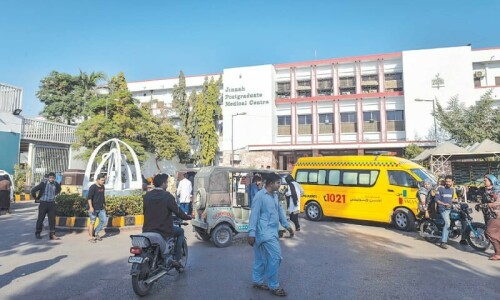KARACHI: Serious tree plantation efforts on the lines of international urban forestry can help reduce Karachi’s temperature, said Inspector General Forest Syed Nasir Mahmood while delivering a lecture at Karachi University (KU) on Friday.
Titled ‘Recent advances in ecosystem development’, the programme was organised by Dr Panjwani Centre for Molecular Medicine and Drug Research and the Virtual Education Project-Pakistan at KU’s International Centre for Chemical and Biological Sciences.
“There is a dire need to promote vertical or roof gardening in the megalopolis where 80 per cent of land is covered with concrete,” Mr Mahmood said.
He described deforestation and degradation of forests as real threats to the country’s ecosystem.
“Internationally, deforestation and forest degradation impact the lives of millions of people whose livelihoods depend on forests,” he said.
He was of the view that if plantation efforts were taken in Karachi on scientific lines as is happening in other countries, Karachi’s temperature could be brought down by at least six to 10 degrees centigrade.
People in Karachi like the rest of the country, were being supplied with vegetables grown with sewage, he said, suggesting that people should try growing vegetables and fruit in whatever space is available to them.
Talking about Reducing Emissions from Deforestation and Degradation Plus (REDD+), he said that it’s a new paradigm and new hope to alleviate global emissions.
Forests, he pointed out, had a critical role in mitigating climate change as they acted as a carbon sink. “Deforestation weakens this foremost carbon sink function. It is estimated that 15 to 20 per cent of all greenhouse gas emissions are the result of deforestation,” Mr Mahmood explained.
According to him, the forestry sector is facing great destruction worldwide despite the fact that this sector contributes greatly to national development goals and provides more than eight per cent of gross domestic product (GDP) in some developing countries. Demographic factors, including population growth, density, distribution, migration, and urbanisation were important drivers of deforestation. Forest fires were also a key factor contributing to deforestation, he said.
Pakistan had lost significant forest cover over the years and urgently needed steps to counter adverse effects of climate change. That’s only possible through promoting forest culture in the country, he concluded.
Prof Muhammad Iqbal Choudhary of ICCBS also spoke.
Published in Dawn, May 5th, 2018












































